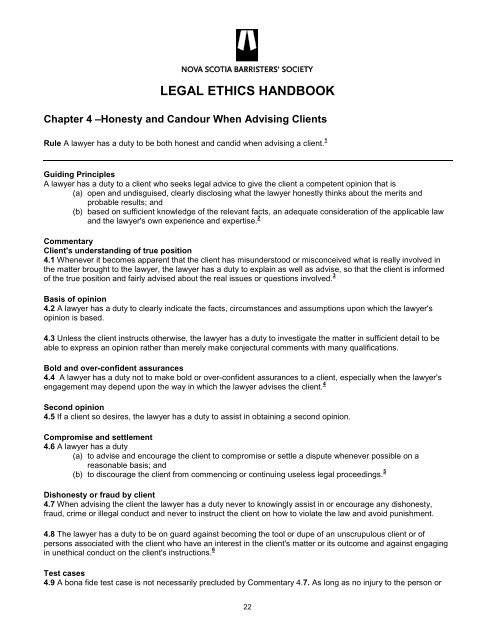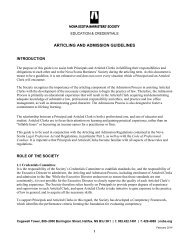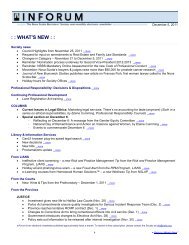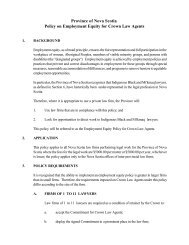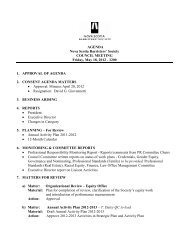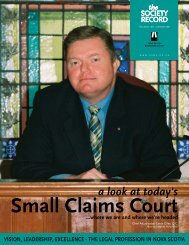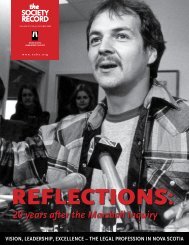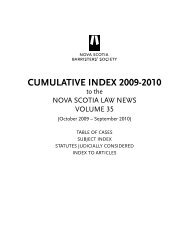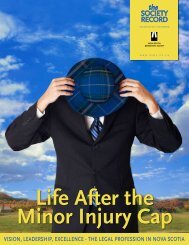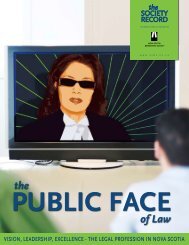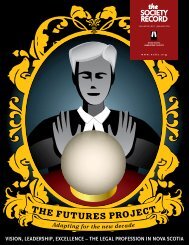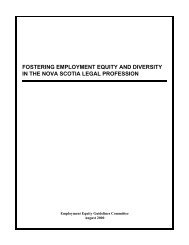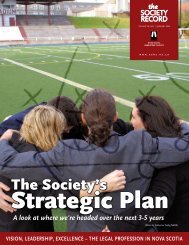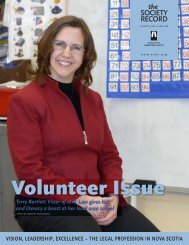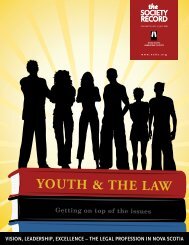legal ethics handbook - Nova Scotia Barristers' Society
legal ethics handbook - Nova Scotia Barristers' Society
legal ethics handbook - Nova Scotia Barristers' Society
You also want an ePaper? Increase the reach of your titles
YUMPU automatically turns print PDFs into web optimized ePapers that Google loves.
LEGAL ETHICS HANDBOOK<br />
Chapter 4 –Honesty and Candour When Advising Clients<br />
Rule A lawyer has a duty to be both honest and candid when advising a client. 1<br />
Guiding Principles<br />
A lawyer has a duty to a client who seeks <strong>legal</strong> advice to give the client a competent opinion that is<br />
(a) open and undisguised, clearly disclosing what the lawyer honestly thinks about the merits and<br />
probable results; and<br />
(b) based on sufficient knowledge of the relevant facts, an adequate consideration of the applicable law<br />
and the lawyer's own experience and expertise. 2<br />
Commentary<br />
Client's understanding of true position<br />
4.1 Whenever it becomes apparent that the client has misunderstood or misconceived what is really involved in<br />
the matter brought to the lawyer, the lawyer has a duty to explain as well as advise, so that the client is informed<br />
of the true position and fairly advised about the real issues or questions involved. 3<br />
Basis of opinion<br />
4.2 A lawyer has a duty to clearly indicate the facts, circumstances and assumptions upon which the lawyer's<br />
opinion is based.<br />
4.3 Unless the client instructs otherwise, the lawyer has a duty to investigate the matter in sufficient detail to be<br />
able to express an opinion rather than merely make conjectural comments with many qualifications.<br />
Bold and over-confident assurances<br />
4.4 A lawyer has a duty not to make bold or over-confident assurances to a client, especially when the lawyer's<br />
engagement may depend upon the way in which the lawyer advises the client. 4<br />
Second opinion<br />
4.5 If a client so desires, the lawyer has a duty to assist in obtaining a second opinion.<br />
Compromise and settlement<br />
4.6 A lawyer has a duty<br />
(a) to advise and encourage the client to compromise or settle a dispute whenever possible on a<br />
reasonable basis; and<br />
(b) to discourage the client from commencing or continuing useless <strong>legal</strong> proceedings. 5<br />
Dishonesty or fraud by client<br />
4.7 When advising the client the lawyer has a duty never to knowingly assist in or encourage any dishonesty,<br />
fraud, crime or il<strong>legal</strong> conduct and never to instruct the client on how to violate the law and avoid punishment.<br />
4.8 The lawyer has a duty to be on guard against becoming the tool or dupe of an unscrupulous client or of<br />
persons associated with the client who have an interest in the client's matter or its outcome and against engaging<br />
in unethical conduct on the client's instructions. 6<br />
Test cases<br />
4.9 A bona fide test case is not necessarily precluded by Commentary 4.7. As long as no injury to the person or<br />
22


